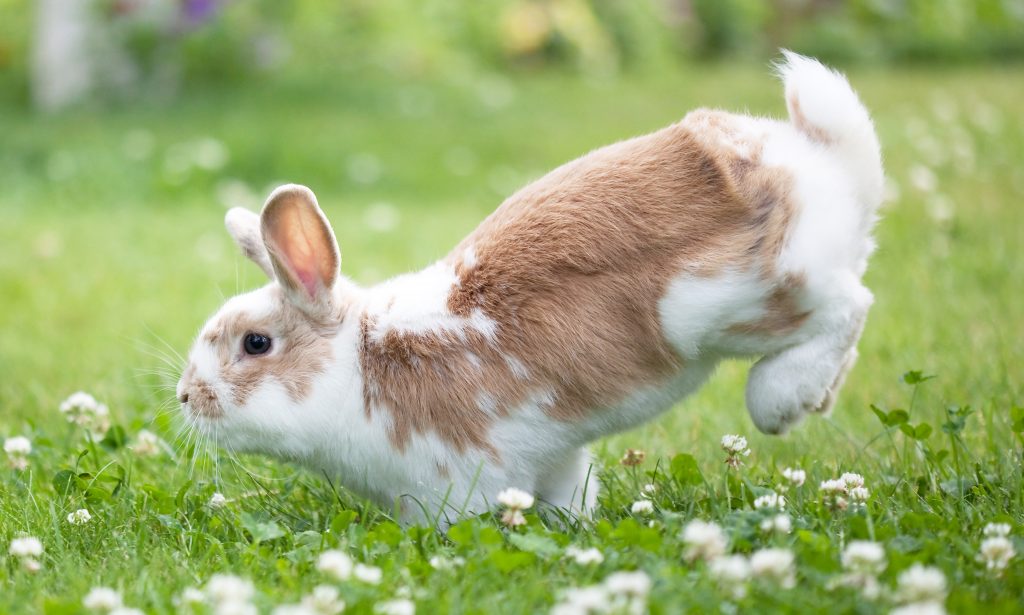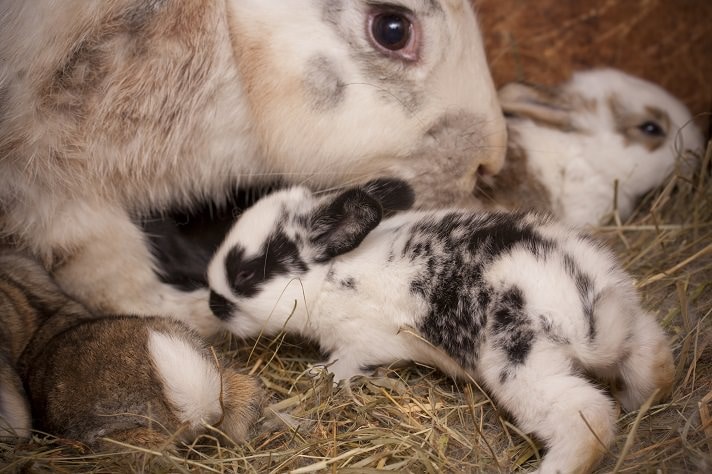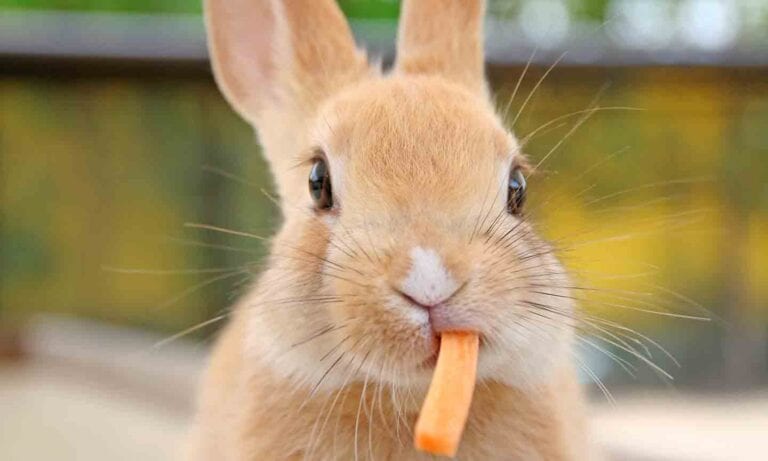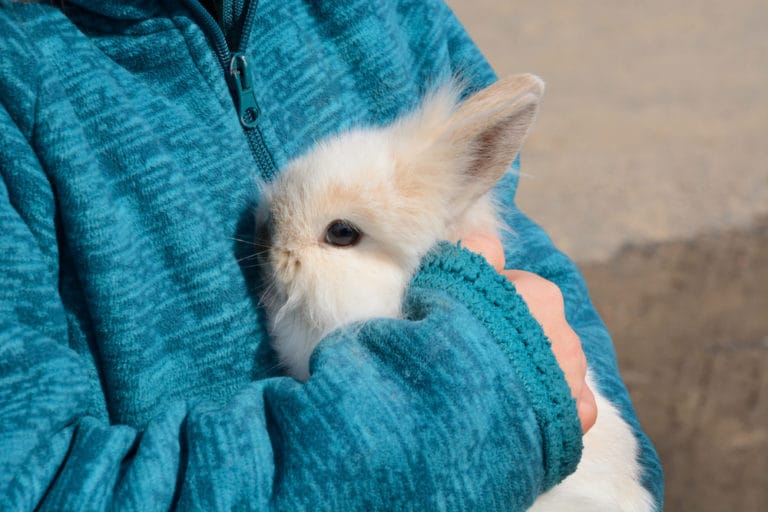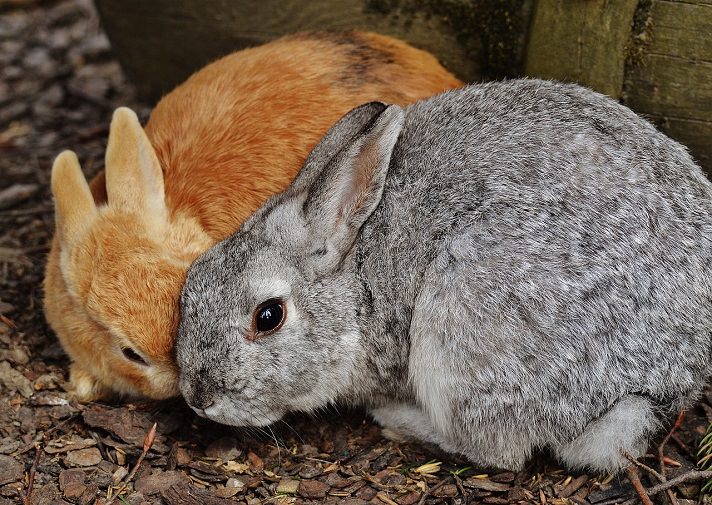With their long ears, soft fur and fuzzy tails, rabbits can certainly be cute and cuddly. Cuteness aside, rabbits also have some peculiar and perplexing habits. Whether you just got a new rabbit or you’re an experienced rabbit parent, you may be looking for a way to decipher your rabbit’s body language.
Understanding rabbit behavior can not only help you form a stronger bond with your bunny, but it may also help you identify underlying health issues or medical emergencies that may require a visit to your vet.
We spoke to Dr. Melissa Witherell, DVM, veterinary consultant at Chewy, about the most common rabbit behaviors and what they mean.
1Chinning
@itsbunnycoco Chinning means it’s his #fyp #foryoupage #bunny #rabbit ♬ Cooking - Oleg Kirilkov
When you introduce your rabbit to a new environment or let them have the run of a room, don’t be surprised to see them rub their chin against furniture and whatever other objects they comes across, including you!
Rabbit chinning is your bunny’s way of saying, “Dibs!”
Rabbits have a scent glands under the chin that leaves an odor on whatever the rabbit rubs his chin against. You won’t be able to smell this marking behavior; other rabbits can detect the scent but not people.
2Running About in a Tizzy
@beccaamylouise I love finding zoomies from when they were younger 🥹 #bunny #rabbits #animals #fyp #zoomies ♬ original sound - Becca
Rabbits like things just the way they left them.
Rabbits are prey animals, so memorizing the layout of the environment—especially any potential escape routes—is a hardwired, natural instinct. So, don’t be surprised to see your rabbit run about the room and retrace their route if you’ve changed the layout they’re used to—like moving furniture or adding a new chair.
3Eating Poop
@bruceytherabbit They’re actually called “cecotropes” and they are very high in vitamins/minerals😋🤢 #Splice #rabbits #fyp #bunny #bunniesoftiktok #rabbitsoftiktok #fypシ ♬ original sound - 444.songss
Rabbits eat a small bit of their poop. It might sound gross, but rabbits do this for a legit health benefit.
The poop they consume is called “cecotropes,” which is different from the rabbit’s regular poop in that it is softer and full of nutrients the rabbit needs. It is also referred to as “night feces,” because rabbits ingest them typically late at night or early in the morning.
The rabbit is essentially re-digesting their rabbit food in order to absorb the vital vitamins and minerals missed during the first go-around through the digestive tract.
4Grooming
@brooklynbundad I huff my rabbit all day because they actually smell good? Just me?! 😅#ItsOurHome #rabbitcare #bunnytok ♬ Bunny, Bunny, Bunny - The Golden Orchestra
Rabbits keep their fur and paws clean by licking themselves frequently throughout the day, much like cats. Rabbits generally don’t need to be bathed, but they do need regular brushing to minimize the amount of hair they ingest during grooming.
One of the cutest grooming postures a bunny will do is sit up, lick and then fling their paws out karate-style and rub them against their face.
5Licking You
@mamamikala Why is he the cutest 😭😭 #inlove #petsontiktok #bunny #cute ♬ original sound - Mikala Taylor
Two bonded rabbits will show affection by grooming each other. Your rabbit might show their affection for you in a similar way, by licking you!
A rabbit might also lick you to let you know they want to be petted.
6Nudging
@bunny_hi Here is part two and without voice change haha❤️🥰😘 #foryou #fyp #bunnytips #thefamousbunny #inspierdoflennonthebunny ♬ Chopin Nocturne No. 2 Piano Mono - moshimo sound design
When a rabbit wants your attention, they will nudge you with their nose.
You can expect a nose nudge when you have a tasty treat in your hand or when your bunny wants you to pet them. They will nudge your hand or arm and wait for you to pet him.
Dr. Witherell adds they may also nudge your hand away if they are done with that attention.
7Grinding Teeth
@rexrabbitrex *Happy teeth grinding* #rabbit #bunny #happy ♬ original sound - 🐰 Rex Rabbit Rex 🐰
A relaxed, happy rabbit might grind their teeth gently together almost rhythmically. This is audible if you are in close proximity or petting your rabbit.
Loud teeth crunching, however, can be a sign that your rabbit is in pain, and this is often accompanied by tense body language (e.g. hunched with ears held tight against their body).
8Thumping
@hazelnut_the_bunny Replying to @Tabs a compelation of thumps without the voiceover! #bunniesoftiktok #rabbiteducation #rabbitsoftiktok #bunnythump #bunnystomp #bunnyasmr ♬ original sound - Hazel The Bunny
When a rabbit is not happy with something you did or with something in their environment, they might express their displeasure with a loud “thump,” which is accomplished by smacking their back feet hard against the ground.
You might hear a “thump” when you put them back in their pen when they were happily free roaming around a room. The “thump” is often followed by the rabbit hopping away and turning their back to you—the ultimate bunny diss!
Rabbits will also stomp their back legs to make a thump if they sense danger to warn other rabbits, Dr. Witherell says. “They may also do this if they are upset with something going on to warn their owner or another animal to stop what they are doing.”
9Dropping Fecal Pellets
You’ll know that your rabbit likes where they are if they start dropping a little trail of fecal rabbit pellets behind them as they hop about.
They might be fully litter-trained, but they’re choosing to go outside the box to claim their newfound territory.
10Jumping
@oreo.thebunnyrabbit How can you not? 😉 #petsoftiktok #rabbittok #cutebunnies #bunnylover #binky ♬ original sound - f69v_
“When rabbits are very happy, they can jump up in the air with a sideways kick or a body shake,” says Dr. Witherell.
This is referred to as a “boink” or binky.
A boinking bunny is happy and in a playful mood.
11Tossing Things
@thesleepysonographer he’s an interesting one #bunny #bunniesoftiktok #animalsoftiktok #rescuepet ♬ G.A.B - BCD Studio
Rabbits sometimes toss items about. These can include rabbit toys, their litter box or their food dishes.
Tossing can be a sign of wanting to play or, in the case of a tossed rabbit food bowl, a way to get your attention. The bunny is saying, “Feed me!”
12Growling/Lunging
@tokimekibunny Reply to @zyglavis ♬ original sound - 𝓑𝓾𝓷𝓷𝔂 🥕
A rabbit might growl and/or lunge if they feel threatened, especially if they’re backed into a corner and have no way of escape.
Try to avoid situations where your rabbit might feel threatened such as chasing your rabbit around a room when they want to be left alone.
13Flopping
A bunny flop is when your pet rabbit falls over onto its side, sometimes very dramatically. And when your rabbit flops over and throws themself onto their side, this means they’re relaxed and might be about to take a nap, Dr. Witherell says.
"This is a content, relaxed behavior."
14Loafing
Loafing, also called splooting, is when your house rabbit turns themself into a little loaf. They may tuck their front legs in or stretch out their back legs.
“Tucking their front paws underneath them is often a relaxed, comfortable position for your rabbit when resting,” says Dr. Witherell.
15Nest Building
@soraya9514 When do you think Lilly will have her babies?! 🐰 #rabbit #bunny #netherlanddwarf #rabbitsoftiktok #babies #pregnant #pets ♬ Send Me on My Way - Vibe Street
Female rabbits may start building a nest and pulling out their fur to use as insulation for this nest if they’re pregnant. A pregnant bunny may also act more aggressively, growling, lunging and biting more than usual.
Even after spaying, your female rabbit may experience a false pregnancy that causes her to mimic these behaviors.
16Vocalizations
@fureverlop The sound rabbits make when they eat #clucking #fyp #noisey #happylops #lopbunnies #rabbits ♬ original sound - FureverLop
Rabbits make a lot of sounds, some of which include purring, teeth grinding, clucking, grunting, whining, honking and snorting. This is your bunny’s way of communicating with you and getting out all of their rabbit feels.
Different sounds can mean different things. For example:
- Clucking, purring and humming are signs of happiness and contentment.
- Growling, snorting, hissing and whining are signs of discontent.
- Teeth grinding can indicate happiness or pain/distress (so if your bunny does this often, it might be a good idea to check in with the vet).
FAQs about Bunny Body Language
More about rabbit behavior and caring for them:
Share:
